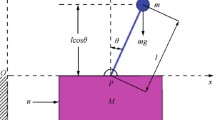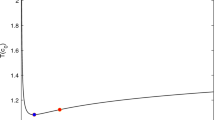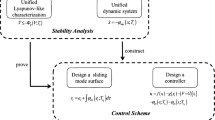Abstract
This paper presents a novel design method for discrete-time repetitive control systems (RCS) based on two-dimensional (2D) discrete-time model. Firstly, the 2D model of an RCS is established by considering both the control action and the learning action in RCS. Then, through constructing a 2D state feedback controller, the design problem of the RCS is converted to the design problem of a 2D system. Then, using 2D system theory and linear matrix inequality (LMI) method, stability criterion is derived for the system without and with uncertainties, respectively. Parameters of the system can be determined by solving the LMI of the stability criterion. Finally, numerical simulations validate the effectiveness of the proposed method.
Similar content being viewed by others
References
T. Inoue, M. Nakano, S. Iwai. High accuracy control of servomechanism for repeated contouring. In Proceedings of the 10th Annual Symposium on Incremental Motion Control System and Devices, Chicago, USA, pp. 258–292, 1981.
S. Hara, Y. Yamamoto, T. Omata, M. Nakano. Repetitive control system: A new type servo system for periodic exogenous signals. IEEE Transactions on Automatic Control, vol. 33, no. 7, pp. 659–668, 1988.
M. Tomizuka, T. C. Tsao, K. K. Chew. Analysis and synthesis of discrete-time repetitive controllers. ASME Transactions of Dynamic Systems, Measurement, and Control, vol. 111, no. 3, pp. 353–358, 1989.
R. W. Longman. Iterative learning control and repetitive control for engineering practice. International Journal of Control, vol. 73, no. 10, pp. 930–954, 2000.
J. Ghosh, B. Paden. Nonlinear repetitive control. IEEE Transactions on Automatic Control, vol. 45, no. 5, pp. 949–954, 2000.
M. Steinbuch, S. Weiland, T. Singh. Design of noise and period-time robust high-order repetitive control, with application to optical storage. Automatica, vol. 43, no. 12, pp. 2086–2095, 2007.
L. P. Wang, C. T. Freeman, E. Rogers, D. H. Owens. Experimentally validated continuous-time repetitive control of non-minimum phase plants with a prescribed degree of stability. Control Engineering Practice, vol. 18, no. 10, pp. 1158–1165, 2010.
K. Zhou, D. Wang, B. Zhang, Y. Wang, J. A. Ferreira, S. W. H. de Haan. Dual-mode structure digital repetitive control. Automatica, vol. 43, no. 3, pp. 546–554, 2007.
O. P. Nstor, T. C. Tsao, S. G. James. A new method for synthesizing multiple-period adaptive-repetitive controllers and its application to the control of hard disk drives. Automatica, vol. 46, no. 7, pp. 1186–1195, 2010.
S. L. Chen, T. H. Hsieh. Repetitive control design and implementation for linear motor machine tool. International Journal of Machine Tools and Manufacture, vol. 47, no. 12–13, pp. 1807–1816, 2007.
W. S. Chen, R. H. Li, J. Li. Observer-based adaptive iterative learning control for nonlinear systems with timevarying delays. International Journal of Automation and Computing, vol. 7, no. 4, pp. 438–446, 2010.
D. H. Owens, M. Tomas-Rodriguez, J. J. Hatonen. Limiting behaviour in parameter optimal iterative learning control. International Journal of Automation and Computing, vol.3, no. 3, pp. 222–228, 2006.
M. Wu, Y. H. Lan, J. H. She. A new design method for repetitive control systems based on two-dimensional hybrid model. Acta Automatica Sinica, vol. 34, no. 9, pp. 1208–1214, 2008. (in Chinese)
Y. H. Lan, M. Wu, J. H. She. H ∞ repetitive control of linear systems based on two-dimensional model. International Journal of Computing Science and Mathematics, vol.2, no. 3, pp. 267–289, 2009.
M. Wu, Y. H. Lan, J. H. She, Y. He. Stability analysis and controller design for repetitive control system based on 2D hybrid model. In Proceedings of the 17th international Federation of Automatic Control World Congress, Seoul, Korea, vol. 17, no. 1, pp. 370–375, 2008.
E. Rogers, K. Galkowski, D. H. Owens. Control Systems Theory and Applications for Linear Repetitive Processes, Berlin, Germany: Springer-Verlag, 2002.
P. P. Khargonek, I. R. Petersen, K. Zhou. Robust stabilization of uncertain linear systems: Quadratic stabilizability and H ∞ control theory. IEEE Transactions on Automatic Control, vol. 35, no. 3, pp. 356–361, 1990.
L. H. Xie. Output feedback H ∞ control of systems with parameter uncertainty. International Journal of Control, vol. 63, no. 4, pp. 741–750, 1996.
F. R. Shaw, K. Srinivasan. Discrete-time repetitive control systems design using the regeneration spectrum. ASME Transactions of Dynamic Systems, Measurement, and Control, vol. 115, no. 2A, pp. 228–237, 1993.
C. Smith, M. A. Tomizuka. A cost effective repetitive control and its design. In Proceedings of American Control Conference, IEEE, Chicago, USA, vol. 2, pp. 1169–1174, 2000.
C. M. Chang, T. S. Liu. Application of discrete wavelet transform to repetitive control. In Proceedings of American Control Conference, IEEE, Anchorage, USA, vol. 6, pp. 4560–4565, 2002.
J. H. She, Y. Pan, M. Nakano. Repetitive control system with variable structure controller. In Proceedings of the 6th International Workshop on Variable Structure Systems, Gold Coast, Australia, pp. 273–282, 2000.
Author information
Authors and Affiliations
Corresponding author
Additional information
This work was supported by National Natural Science Foundation of China (Nos. 60974045 and 60674016) and the Research Foundation of Education Bureau of Hunan Province, China (No. 08C090).
Song-Gui Yuan received his B. Sc. degree in automation from Xiangtan University in 1993, and M. Sc. degree in Technology of Computer Application from Changsha University of Science and Technology, PRC in 2003. In 1998, he was a lecturer at Changsha Communications Institute. Currently, he is an assistant professor at the School of Electrical and Information Engineering, Changsha University of Science and Technology, PRC.
His research interests include robust control and repetitive control theory.
Min Wu received his B. Sc. and M. Sc. degrees in engineering from Central South University, Changsha, PRC in 1983 and 1986, respectively. He received the Ph.D. degree in engineering from Tokyo Institute of Technology, Japan in 1999. Since July 1986, he has been with Central South University, where he is currently a professor of automatic control engineering at the School of Information Science and Engineering. He was a visiting scholar in the Department of Electrical Engineering, Tohoku University, Japan from 1989 to 1990, a visiting research scholar in the Department of Control and Systems Engineering, Tokyo Institute of Technology, Tokyo from 1996 to 1999, and a visiting professor at the School of Mechanical, Materials, Manufacturing and Management, University of Nottingham, England from 2001 to 2002. He is an IEEE senior member and a member of Nonferrous Metals Society of China and China Automation Association. He received the Best Paper Award at the International Federation of Automatic Control in 1999 (jointly with M. Nakano and J. H. She).
His research interests include robust control and its application, process control and intelligent control.
Bao-Gang Xu received his B. Sc. degree in engineering from the Central South University, PRC in 2009. Currently, he is a master student in the Department of Control Engineering at the School of Information Science and Engineering, Central South University, PRC.
His research interests include mechatronics and application of control theory.
Rui-Juan Liu received her B. Sc. and M. Sc. degrees in mathematics from Changsha University of Science and Technology, PRC in 2004 and 2008, respectively. Currently, she is a Ph. D. candidate at the School of Information Science and Engineering, Central South University, PRC.
Her research interests include robust control and its application.
Rights and permissions
About this article
Cite this article
Yuan, SG., Wu, M., Xu, BG. et al. Design of discrete-time repetitive control system based on two-dimensionalmodel. Int. J. Autom. Comput. 9, 165–170 (2012). https://doi.org/10.1007/s11633-012-0629-1
Received:
Revised:
Published:
Issue Date:
DOI: https://doi.org/10.1007/s11633-012-0629-1




